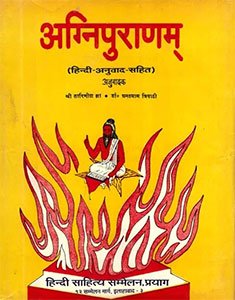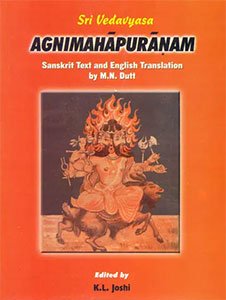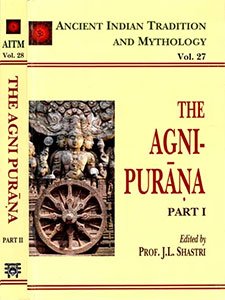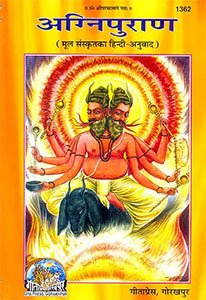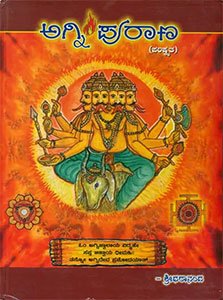Agni Purana [sanskrit]
97,288 words
This Sanskrit edition of the Agnipurana. It is one of the traditional eighteen Mahapuranas presented as an encyclopedia of ancient Indian history and knowledge. It contains either 382 or 383 chapters and over 10.000 verses (Sanskrit Shlokas).
Verse 133.25
पिच्छिकान्तु प्रवक्ष्यामि मन्त्रसाधनजां क्रियां ।
ओं ह्रूं पक्षिन् क्षिप ओं हूं सः महाबलपराक्रम सर्वसैन्यं भक्षय २ ओं मर्दय २ ओं चूर्णय २ ओं विद्रावय २ ओं हूं खः ओं भैरवो ज्ञापयति स्वाहा ।
अमुञ्चन्द्रग्रहणे तु जपङ्कृत्वा तु पिच्छिकां ॥ २५ ॥
picchikāntu pravakṣyāmi mantrasādhanajāṃ kriyāṃ |
oṃ hrūṃ pakṣin kṣipa oṃ hūṃ saḥ mahābalaparākrama sarvasainyaṃ bhakṣaya 2 oṃ mardaya 2 oṃ cūrṇaya 2 oṃ vidrāvaya 2 oṃ hūṃ khaḥ oṃ bhairavo jñāpayati svāhā |
amuñcandragrahaṇe tu japaṅkṛtvā tu picchikāṃ || 25 ||
The Sanskrit text of Verse 133.25 is contained in the book The Agni Puranam (Anandashram Edition) by Shri Chimna Apate (श्री चिमणा आपटे). This book is available online or you could buy the latest edition:
Read online Buy now! The Sanskrit text by Shri Chimna Apate (श्री चिमणा आपटे) (1987)
Glossary of Sanskrit terms
Note: This extracts Sanskrit terms and links to English definitions from the glossary, based on an experimental segmentation of verse (133.25). Some terms could be superfluous while some might not be mentioned. Click on the word to show English definitions.
Picchika, Prava, Kshi, Amin, Mantrasadhana, Kriya, Pakshin, Hum, Sah, Mahabalaparakrama, Sarvasainya, Vidrava, Kha, Bhairava, Jnapayat, Svaha, Dra, Grahana, Grahani, Pac, Kritva, Kritvan,
Analysis of Sanskrit grammar
Note: this is an experimental feature and only shows the first possible analysis of the Sanskrit text (Verse 133.25). If the system was successful in segmenting the sentence, you will see of which words it is made up of, generally consisting of Nouns, Pronouns, Verbs, Participles and Indeclinables. Click on the link to show all possible derivations of the word.
- Line 1: “picchikāntu pravakṣyāmi mantrasādhanajāṃ kriyāṃ ”
- picchikā -
-
picchikā (noun, feminine)[nominative single]
- antu -
-
antu (noun, masculine)[compound], [adverb]
- prava -
-
prava (noun, masculine)[compound], [vocative single]prava (noun, neuter)[compound], [vocative single]
- kṣyā -
-
kṣi (noun, feminine)[instrumental single]
- ami -
-
amin (noun, masculine)[compound], [adverb]amin (noun, neuter)[compound], [adverb], [nominative single], [vocative single], [accusative single]
- mantrasādhana -
-
mantrasādhana (noun, neuter)[compound], [vocative single]
- jām -
-
jā (noun, feminine)[accusative single]
- kriyām -
-
kriyā (noun, feminine)[accusative single]
- Line 2: “oṃ hrūṃ pakṣin kṣipa oṃ hūṃ saḥ mahābalaparākrama sarvasainyaṃ bhakṣaya 2 oṃ mardaya 2 oṃ cūrṇaya 2 oṃ vidrāvaya 2 oṃ hūṃ khaḥ oṃ bhairavo jñāpayati svāhā ”
- Cannot analyse om*hr
- Cannot analyse hrūm*pa
- pakṣin -
-
pakṣin (noun, masculine)[vocative single]pakṣin (noun, neuter)[vocative single]
- kṣipa* -
-
- Cannot analyse om*hū
- hūm -
-
hūm (indeclinable)[indeclinable]
- saḥ -
-
saḥ (indeclinable correlative)[indeclinable correlative]sa (noun, masculine)[nominative single]
- mahābalaparākrama -
-
mahābalaparākrama (noun, masculine)[compound], [vocative single]mahābalaparākrama (noun, neuter)[compound], [vocative single]
- sarvasainyam -
-
sarvasainya (noun, masculine)[adverb], [accusative single]sarvasainya (noun, neuter)[adverb], [nominative single], [accusative single]
- bhakṣaya* -
-
- Cannot analyse 2*oṃ
- Cannot analyse om*ma
- mardaya -
-
√mṛd (verb class 0)[imperative active second single]
- Cannot analyse 2*oṃ
- Cannot analyse om*cū
- cūrṇaya* -
-
- Cannot analyse 2*oṃ
- Cannot analyse om*vi
- vidrāva -
-
vidrāva (noun, masculine)[compound], [vocative single]
- ya* -
-
- Cannot analyse 2*oṃ
- Cannot analyse om*hū
- hūm -
-
hūm (indeclinable)[indeclinable]
- khaḥ -
-
kha (noun, masculine)[nominative single]
- Cannot analyse om*bh
- bhairavo* -
-
bhairava (noun, masculine)[nominative single]
- jñāpayati -
-
√jñā -> jñāpayat (participle, masculine)[locative single from √jñā]√jñā -> jñāpayat (participle, neuter)[locative single from √jñā]√jñā (verb class 0)[present active third single]
- svāhā -
-
svāhā (indeclinable)[indeclinable]svāhā (noun, feminine)[nominative single]
- Line 3: “amuñcandragrahaṇe tu japaṅkṛtvā tu picchikāṃ ”
- amuñcan -
-
√muc (verb class 6)[imperfect active third plural]√muñc (verb class 1)[imperfect active third plural]
- dra -
-
dra (noun, masculine)[compound], [vocative single]
- grahaṇe -
-
grahaṇa (noun, masculine)[locative single]grahaṇa (noun, neuter)[nominative dual], [vocative dual], [accusative dual], [locative single]grahaṇā (noun, feminine)[nominative dual], [vocative single], [vocative dual], [accusative dual]grahaṇi (noun, feminine)[vocative single]
- tu -
-
tu (indeclinable particle)[indeclinable particle]
- ja -
-
ja (noun, masculine)[compound], [vocative single]ja (noun, neuter)[compound], [vocative single]
- paṅ -
-
pac (noun, masculine)[adverb], [nominative single], [vocative single]pa (noun, masculine)[adverb]pa (noun, neuter)[adverb]
- kṛtvā -
-
kṛtvā (indeclinable)[indeclinable]√kṛ -> kṛtvā (absolutive)[absolutive from √kṛ]√kṛ -> kṛtvā (absolutive)[absolutive from √kṛ]√kṛ -> kṛtvā (absolutive)[absolutive from √kṛ]√kṛ -> kṛtvā (absolutive)[absolutive from √kṛ]kṛtvan (noun, masculine)[nominative single]
- tu -
-
tu (indeclinable particle)[indeclinable particle]
- picchikām -
-
picchikā (noun, feminine)[accusative single]
Other editions:
Also see the following editions of the Sanskrit text or (alternative) English translations of the Verse 133.25
Agni Purana with Hindi Translation
by Tarinish Jha and Dr. Ghanshayam Tripathi (तारिणीश् झा और डॉ. घनश्याम त्रिपाठी) (2007)
Publisher: Hindi Sahitya Sammelan, Allahabad; 1199 pages; Title: अग्निपुराणम् (संस्कृत एवं हिन्दी अनुवाद);
Buy now!
Agni Purana (Two Volumes)
by M. N. Dutt (2023)
Publisher: Parimal Publication Pvt. Ltd.; Editor: K. L. Joshi.; ISBN-10: 8171101690; ISBN-13: 9788171101696; 1070 pages.
Buy now!
Agni-Purana (Set of 4 Volumes)
by N. Gangadharan (2006)
Publisher: Motilal Banarsidass Publishers Pvt. Ltd.; ISBN: Part I 8120803590 (9788120803596); Part II 8120803604 (9788120803602); Part III 8120801741 (9788120801745); Part IV 812080306X (9788120803060); 1271 pages.
Buy now!
The Agni Purana (Hindi)
by (2013)
Publisher: Gita Press, Gorakhpur; Title: अग्निपुराण (केवल हिन्दी अनुवाद); ISBN-10: 8129302934; ISBN-13: 9788129302939; 848 pages.
Buy now!
Agni Purana (Kannada)
by Sreedharananda (2013)
Publisher: Pooja Pusthaka Bhandara, Bangalore; Title: ಅಗ್ನಿ ಪುರಾಣ; 560 pages.
Buy now!Preview of verse 133.25 in Kannada sript:
ಪಿಚ್ಛಿಕಾನ್ತು ಪ್ರವಕ್ಷ್ಯಾಮಿ ಮನ್ತ್ರಸಾಧನಜಾಂ ಕ್ರಿಯಾಂ ।
ಓಂ ಹ್ರೂಂ ಪಕ್ಷಿನ್ ಕ್ಷಿಪ ಓಂ ಹೂಂ ಸಃ ಮಹಾಬಲಪರಾಕ್ರಮ ಸರ್ವಸೈನ್ಯಂ ಭಕ್ಷಯ ೨ ಓಂ ಮರ್ದಯ ೨ ಓಂ ಚೂರ್ಣಯ ೨ ಓಂ ವಿದ್ರಾವಯ ೨ ಓಂ ಹೂಂ ಖಃ ಓಂ ಭೈರವೋ ಜ್ಞಾಪಯತಿ ಸ್ವಾಹಾ ।
ಅಮುಞ್ಚನ್ದ್ರಗ್ರಹಣೇ ತು ಜಪಙ್ಕೃತ್ವಾ ತು ಪಿಚ್ಛಿಕಾಂ ॥ ೨೫ ॥
![Agni Purana [sanskrit] - book cover](/uploads/a/Agni-Purana-Sanskrit.jpg)
